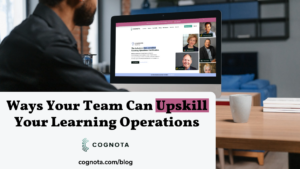Instructional designers and subject matter experts (SMEs) are increasingly finding themselves working together for learning projects. Each side has its own agenda, and for the under-resourced instructional designer trying to manage multiple projects at once, a deeper understanding of the SME’s perspectives can ensure that any project will be completed with success.
Create a sense of ownership.
As we’ve noted in this blog before, creating a strong sense of project ownership goes a long way in garnering the SME’s trust and dedication to the project. Too often, the SME is ‘pressed’ into helping create courses, tacking on more work to their already overloaded schedule. They may feel that their input in the learning project may not really matter, or have no effect on the overall organization.
Combat this by giving the SME a sense of ownership, assuring them that their name and contributions will be a significant part of the project. Additionally, contact the SME’s manager to ensure that they somehow receive recognition for their cooperation in designing learning for the organization.

Teach, don’t tell.
SMEs are intelligent people. More than likely, they prefer to understand the bigger picture — why the course is being developed and why their participation is so crucial. They may even be curious to know whati nstructional design models you might be using. As such, this is your chance to shine and truly demonstrate your expertise in instructional design and further explain the process.
Unfortunately, according to data compiled by Training Industry, less than half of learning and development leaders consider themselves effective at engaging SMEs. The more compelling you present the project and its value to the organization, the more willing the SME will be to work with you to ensure success.
Add a little bit of career counseling.
You may be the last person from whom the SME expects to receive career advice, but explain to the SME that by helping to build courses and serve as the ‘voice’ of content, they can take these skills beyond the project or even the organization. They may perhaps be interested in getting more involved with industry or professional organizations, or seek speaking engagements at events. That they have been instrumental in building in-house courses at their company demonstrates education leadership and be used to strengthen their professional profile outside of the organization.
Build bridges beyond the project scope.
We all learn from each other. Regardless of the subject matter on which the course is built,the SME may challenge you and actually open up entirely new perspectives for you on how to design and deliver effective courses for your employees.
We all love ADDIE and our models, but there might be some highly technical content which defies our previous approaches, requiring us to think more critically and dynamically. In this way, the SME is training us, and in the end, we become better subject matter experts in instructional design.





